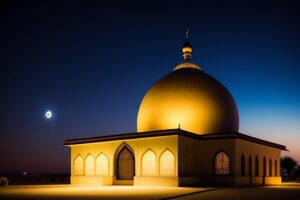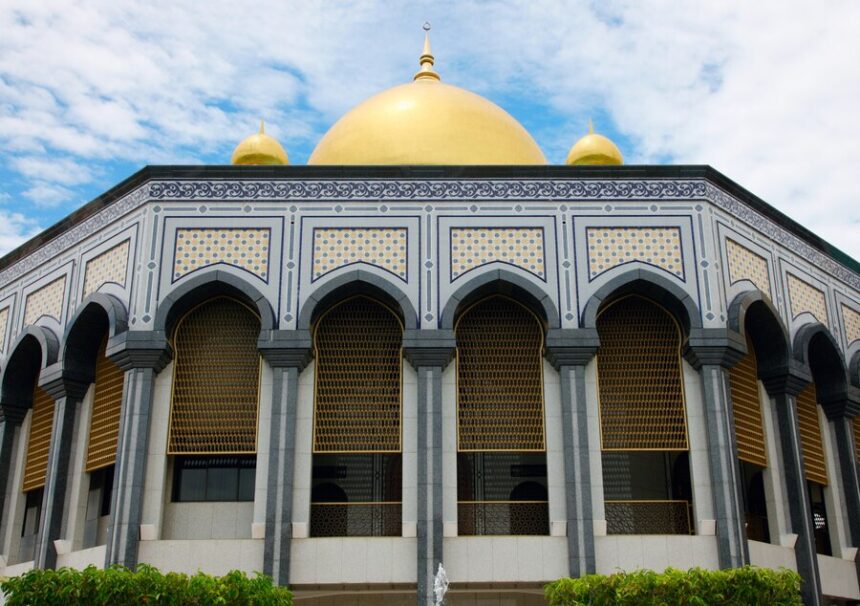The Mosquée Al-Nasr, nestled in the Koekelberg district of Brussels, Belgium, stands as a prominent center of Islamic faith and community life. Situated in the multicultural environment of Brussels, Mosquée Al-Nasr serves as more than just a place of worship. It is a gathering place, an educational hub, and a beacon of support for local Muslims and the broader community. The mosque’s significance is rooted in its history, architectural beauty, cultural activities, and role in fostering interfaith dialogue. This article explores the unique aspects of Mosquée Al-Nasr Koekelberg, shedding light on its role in building a vibrant community.
A Brief History of Mosquée Al-Nasr
The history of Mosquée Al-Nasr is interwoven with the growth of the Muslim community in Brussels. As a city with a substantial Muslim population, Brussels has long served as a cultural crossroads for people from various backgrounds, including large numbers of immigrants from North Africa, the Middle East, and Turkey. The establishment of Mosquée Al-Nasr was a response to the need for a dedicated space for prayer and community gathering in Koekelberg, a district known for its diversity.
In the 1970s, as the Muslim population in Belgium grew, there was a pressing need for local mosques to accommodate the community’s religious practices. Mosquée Al-Nasr was founded with the aim of providing a sanctuary for Muslims to gather for daily prayers, Friday congregational prayers (Jumu’ah), and celebrations of significant Islamic events. Over time, the mosque grew in size and influence, evolving into a central part of life in Koekelberg.
Architectural Design and Interior Aesthetic
Mosquée Al-Nasr features architectural elements that reflect both Islamic and Belgian design influences. The mosque’s exterior is modest yet elegant, blending into the urban landscape while retaining an Islamic architectural identity through its arched windows, crescent motifs, and geometric designs. Its design reflects the mosque’s role as an integral part of the neighborhood while preserving its cultural significance.
Inside, the mosque offers a tranquil atmosphere that allows worshippers to engage in prayer and contemplation. Traditional Islamic design elements—such as intricate calligraphy, arabesque patterns, and beautiful tile work—decorate the prayer hall. The mosque’s interior is spacious and adorned with soft, muted colors, creating a peaceful ambiance conducive to prayer. The architecture of Mosquée Al-Nasr pays homage to both Islamic traditions and the aesthetic preferences of its diverse congregation, which includes people from different cultural backgrounds within the Muslim faith.
Religious Services and Community Engagement
At the core of Mosquée Al-Nasr’s role in Koekelberg is its commitment to providing religious services and fostering a sense of community. The mosque hosts five daily prayers, as well as the Friday Jumu’ah prayer, where an imam delivers a sermon addressing spiritual and social issues. The Friday sermon often focuses on topics relevant to the community, blending Islamic teachings with practical guidance on navigating life in a multicultural society.
In addition to regular prayer services, the mosque plays a vital role during significant Islamic occasions, such as Ramadan and Eid celebrations. During Ramadan, the mosque becomes a focal point of community life, offering Iftar (the evening meal to break the fast) for worshippers and hosting Taraweeh prayers. For the celebration of Eid al-Fitr and Eid al-Adha, the mosque welcomes large numbers of congregants, turning these festivals into lively events that bring together families and friends.
The mosque’s outreach efforts extend beyond religious services, as it frequently organizes events and activities that promote unity and social welfare. These activities include charity drives, food distributions, and fundraising efforts for those in need. By addressing social challenges within the community, Mosquée Al-Nasr has established itself as a center of compassion and support, embodying the Islamic values of charity and kindness.
Educational Programs and Islamic Learning
Education plays a fundamental role in the mission of Mosquée Al-Nasr. The mosque offers a range of educational programs for children, teenagers, and adults, aiming to provide Islamic knowledge and foster a strong sense of identity within the Muslim community. For children, the mosque runs classes that teach Qur’an recitation, basic Islamic principles, and the Arabic language. These classes are often scheduled on weekends, making it convenient for families to participate.
For adults, the mosque provides lectures, workshops, and study groups on various topics, from the fundamentals of Islamic belief and practice to contemporary issues faced by Muslims in Europe. These educational programs are open to all, allowing both lifelong learners and newcomers to deepen their understanding of Islam.
Furthermore, Mosquée Al-Nasr frequently invites guest speakers and scholars to hold seminars on topics related to Islamic jurisprudence, theology, and ethics. Through these educational initiatives, the mosque nurtures a community that is knowledgeable, spiritually aware, and connected to its cultural roots.
Promoting Interfaith Dialogue and Cultural Exchange

Mosquée Al-Nasr in Koekelberg has taken an active role in promoting interfaith dialogue and fostering mutual understanding among people of different religions. In a city as diverse as Brussels, building bridges between communities is essential for creating a harmonious society. The mosque regularly participates in interfaith events, inviting people from various religious backgrounds to visit, learn, and engage in conversations about shared values.
One such event is the “Open Mosque Day,” where Mosquée Al-Nasr opens its doors to the public, offering guided tours, presentations, and question-and-answer sessions. This annual event provides a valuable opportunity for non-Muslims to gain insight into Islamic practices, ask questions, and witness the mosque’s community activities firsthand. By participating in such initiatives, Mosquée Al-Nasr encourages greater understanding and breaks down stereotypes, fostering a sense of unity and respect within the broader community.
In addition to organized events, the mosque collaborates with local churches, synagogues, and other religious institutions on projects aimed at social welfare and community development. These collaborations demonstrate the mosque’s commitment to working alongside other faith-based organizations to address common issues, such as poverty, homelessness, and education, thereby strengthening the social fabric of Koekelberg.
Challenges and Resilience of the Community
Like many religious institutions, Mosquée Al-Nasr has faced challenges over the years, including issues related to funding, space constraints, and occasional tensions arising from misunderstandings about Islam. Despite these challenges, the mosque has shown resilience and adaptability, continually finding ways to support its congregation and engage with the larger Koekelberg community.
Funding remains a significant challenge, as the mosque relies primarily on donations from the community to cover its operational costs. This reliance on community support highlights the deep connection between the mosque and its congregants, who contribute not only financially but also by volunteering their time and resources.
Moreover, the mosque has made a concerted effort to address misconceptions about Islam and Muslims through education and outreach. By engaging with the media, local government, and other organizations, Mosquée Al-Nasr works to promote an accurate understanding of Islam and combat stereotypes. These efforts underscore the mosque’s commitment to peaceful coexistence and the shared goal of creating a society built on mutual respect and understanding.
Read More = Predovac
The Future of Mosquée Al-Nasr in Koekelberg
As the Muslim community in Brussels continues to grow, Mosquée Al-Nasr is poised to expand its role in meeting the evolving needs of its congregation. Plans for the future include improving facilities, expanding educational programs, and increasing outreach efforts to foster deeper connections within the Koekelberg community. The mosque also aims to continue its interfaith and community-focused activities, reinforcing its position as a beacon of peace, knowledge, and cooperation.
The potential expansion of the mosque’s facilities will enable it to serve an even larger number of worshippers and provide more space for community events, classes, and social services. This growth is an indication of the mosque’s enduring relevance and the dedication of its community members to sustaining its mission.
Embracing Modernity While Preserving Tradition
In an ever-evolving world, Mosquée Al-Nasr is embracing modern tools and practices to better serve its community without losing sight of its traditional values. The mosque has begun implementing digital platforms for community updates, event schedules, and educational resources, making it easier for members to stay informed and engaged. A dedicated website and social media presence allow for timely announcements regarding prayer times, upcoming events, and Islamic holidays. Additionally, these digital tools serve as an outreach resource, attracting a wider audience and making it accessible to younger generations familiar with technology.
The mosque has also considered live-streaming Friday sermons and special events to accommodate members unable to attend in person, especially during times of increased public health concerns. This initiative not only supports community members who cannot make it to the mosque but also widens its reach, allowing followers worldwide to connect with its teachings.
The incorporation of digital resources is part of Mosquée Al-Nasr’s broader approach to adapting to contemporary society while preserving its mission of faith, learning, and community service. This forward-thinking approach demonstrates the mosque’s commitment to balancing innovation with tradition, meeting the evolving needs of the community in a meaningful way.
Community Health and Wellness Initiatives
Recognizing the holistic needs of its community, Mosquée Al-Nasr has also taken steps to support physical and mental well-being. The mosque regularly organizes health and wellness workshops, covering topics such as nutrition, exercise, mental health awareness, and stress management. These sessions are often hosted by professionals from within the community, such as doctors, counselors, and fitness experts, who offer culturally sensitive advice tailored to the needs of the congregation.
Mental health, in particular, is an area that the mosque emphasizes, as it is a topic often under-discussed within certain cultural and religious communities. By providing mental health support and addressing common challenges such as anxiety, depression, and stress, Mosquée Al-Nasr is helping to break down stigmas associated with mental well-being. Counseling services, support groups, and referral networks are available for those who may need assistance, underscoring the mosque’s commitment to nurturing the whole person—mind, body, and spirit.
Empowering Youth and Fostering Future Leaders
The mosque places a strong emphasis on youth involvement, recognizing the critical role that younger generations play in shaping the future of the community. Through youth programs, Mosquée Al-Nasr encourages teenagers and young adults to take an active role in the mosque’s activities, fostering a sense of responsibility and leadership. These programs often include mentorship opportunities, sports leagues, volunteer projects, and workshops on personal development, career planning, and civic engagement.
Youth empowerment is a priority, with the mosque investing in initiatives that allow young members to voice their perspectives, learn from experienced mentors, and gain practical skills. By providing a space where youth can explore their identities, develop their talents, and contribute meaningfully, Mosquée Al-Nasr is cultivating a new generation of confident, knowledgeable, and compassionate leaders who are prepared to represent their community in broader society.
Building Bridges: The Role of Mosquée Al-Nasr in a Diverse Society
Brussels is one of Europe’s most diverse cities, and Mosquée Al-Nasr has taken a proactive role in celebrating this diversity. By engaging with different cultural groups and faith communities, the mosque fosters unity and demonstrates Islam’s universal values of peace, respect, and compassion. Programs encouraging inter-community dialogue, collaborative service projects, and cultural exchange events are just some examples of how the mosque contributes to a positive, inclusive society.
One initiative that has become particularly popular is the annual community open day, where the mosque collaborates with other local institutions to host a day of learning, exchange, and celebration. This event includes presentations, cultural performances, food tastings, and Q&A sessions, all aimed at highlighting the beauty of diversity and breaking down cultural barriers. By inviting people of all backgrounds into its space, Mosquée Al-Nasr actively promotes mutual understanding, creating a welcoming environment for dialogue and discovery.
A Legacy of Faith, Service, and Unity
Mosquée Al-Nasr in Koekelberg has earned its place as a cornerstone of faith, community support, and social progress in Brussels. Its journey from a modest place of worship to a vibrant community hub reflects the enduring strength of its mission and the resilience of its congregation. Through its wide-ranging services, educational programs, outreach initiatives, and commitment to inclusivity, Mosquée Al-Nasr exemplifies how a mosque can function as both a religious sanctuary and a thriving community institution.
As it continues to grow and adapt, the mosque remains dedicated to the teachings of Islam that emphasize compassion, unity, and service to humanity. In an increasingly complex world, Mosquée Al-Nasr stands as a source of solace and strength, providing a spiritual home for Muslims in Koekelberg and an enduring symbol of community for all.
The legacy of Mosquée Al-Nasr is one of unwavering faith, a dedication to learning, and an open-hearted embrace of community and diversity. As it looks to the future, the mosque will continue to inspire, support, and uplift all who walk through its doors, reflecting the timeless principles of Islam and the shared values of humanity.
Conclusion: The Heart of Faith and Unity
Mosquée Al-Nasr in Koekelberg is more than just a place of worship; it is a cornerstone of community life, a center of learning, and a source of inspiration for people of all backgrounds. Through its commitment to religious services, educational programs, interfaith dialogue, and social outreach, the mosque exemplifies the values of compassion, understanding, and unity. In a multicultural city like Brussels, where diverse communities coexist, Mosquée Al-Nasr serves as a bridge, fostering connections within the Muslim community and between people of different faiths.
As it continues to grow and adapt to the needs of its community, Mosquée Al-Nasr remains a symbol of resilience, faith, and inclusivity. Its presence in Koekelberg reflects the enduring importance of community institutions in enriching the lives of individuals and promoting a harmonious society. By welcoming worshippers, learners, and visitors alike, the mosque stands as a testament to the power of faith, knowledge, and dialogue in creating a brighter future for all.





